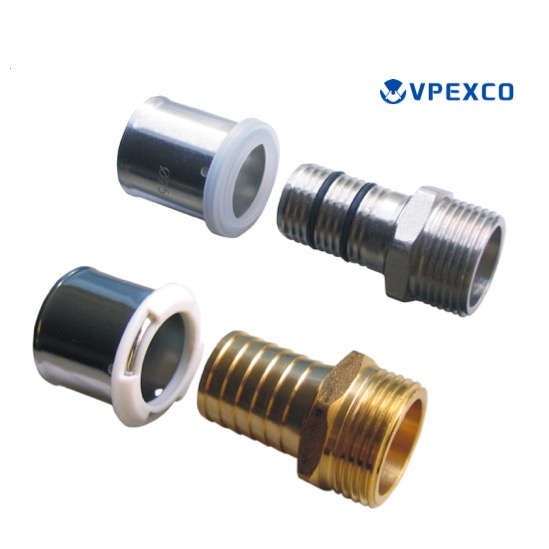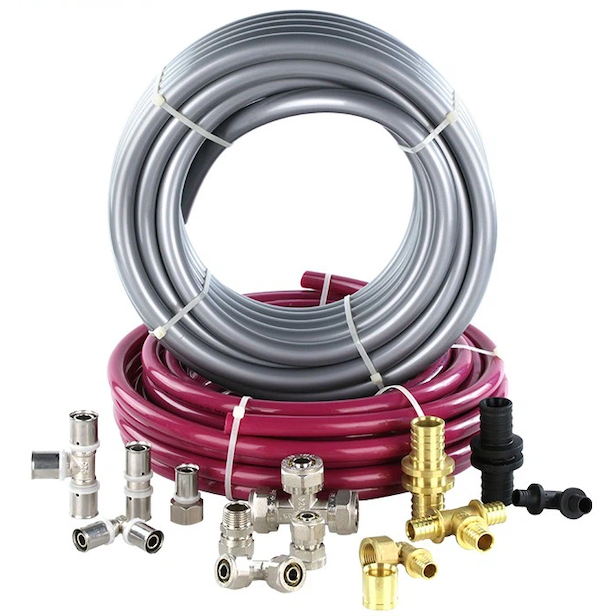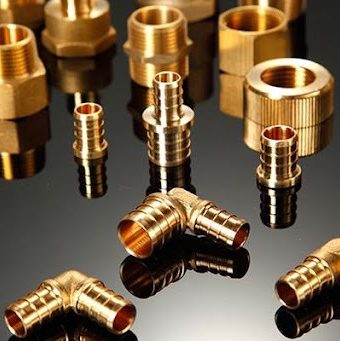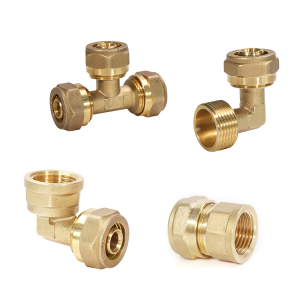Table of Contents
ToggleWhat are the most popular applications for brass pipe fittings?
Plumbing Systems
Brass fittings like elbows, tees, couplings, and adapters are widely used in residential and commercial plumbing systems for potable water supply lines, drain lines, and gas lines. Their corrosion resistance and durability make them ideal for water and gas applications.
Hydronic Heating Systems
Brass pipe fittings are commonly used in hydronic radiant floor heating systems, baseboard heaters, and other hot water heating applications due to their ability to withstand high temperatures and pressures.
Refrigeration and HVAC Systems
The corrosion-resistant properties of brass make it suitable for refrigeration lines carrying refrigerants as well as HVAC systems handling air conditioning and ventilation.
Automotive Applications
Brass fittings are used in automotive fuel lines, brake lines, air brake systems, and other fluid transfer components due to their strength and compatibility with automotive fluids.
Industrial Applications
Brass fittings find applications in various industrial settings like chemical processing plants, oil and gas facilities, and manufacturing plants where they are used to handle corrosive fluids, gases, and high-pressure systems.
Marine Applications
The anti-corrosive nature of brass makes it a preferred choice for marine applications like boat plumbing, bilge systems, and other saltwater exposure scenarios.
Compressed Air and Gas Systems
Brass compression fittings are commonly used in compressed air lines, gas distribution lines, and other pneumatic systems due to their leak-proof connections.
While brass fittings have diverse applications, their corrosion resistance, temperature tolerance, and durability make them especially popular choices for plumbing, heating, refrigeration, and industrial fluid handling systems.
How many different types of Brass PEX Fittings?
For more details, you can check this post How many types of brass fittings for pex pipe connection?
Pex Push fit/ push in fittings - F2854 / ISO 15875
Brass PEX push-in fittings, often known as push-to-connect fittings, represent a significant evolution in plumbing technology due to their innovative design and easy installation process. They are crafted from durable brass for enhanced strength and corrosion resistance, making them an excellent choice for robust plumbing systems.
Pex compression fittings - ISO 15875
PEX compression fittings are specially designed for connecting PEX tubing. These fittings are ideal for both professional and DIY plumbing projects due to their relative simplicity in installation, requiring no special tools or processes, making them a convenient option for a variety of applications.
Pex expansion fittings (for pex a) - F1906
Brass PEX expansion fittings, also known as PEX expansion couplings, are designed specifically for use with PEX-A tubing. Unlike PEX compression fittings, which create a seal by tightening a nut, these fittings employ an expansion tool to expand the tubing and an insert to secure the connection, thereby creating a leak-proof seal as the tubing naturally contracts.
Pex crimp and clamp/pinch fittings - F1807
Brass PEX crimp fittings are known for their easy installation and secure connections. They are virtually leak-proof if installed correctly. The process involves slipping a crimp ring over the end of the PEX tubing, inserting the crimp fitting into the tubing, then using a special crimping tool to tighten the ring, securing the tubing to the fitting.
PEX Press Fittings - ISO 15875
Brass PEX press fittings are universally used in many countries due to their durability, reliability, and ease of assembly.
Pex sliding fittings - ISO 15875
The sliding sleeve system is the traditional connection system used by the installers in their PEX and multilayer pipes installations.

different types of pex fittings connection
How To Choose The Right PEX Fittings for Pex pipe?
Based on the search results provided, here are some key considerations when choosing the right PEX fittings:
PEX Pipe Type
There are three main types of PEX pipes - PEX-A, PEX-B, and PEX-C. The fitting type must match the PEX pipe type you are using.
- PEX-A requires expansion fittings or specific crimp rings
- PEX-B and PEX-C work with crimp rings or clamp fittings
Fitting Material
PEX fittings are available in plastic polymer materials like PPSU or brass. Brass fittings are more expensive but provide superior durability and temperature resistance.
Connection Method
Common PEX fitting connection methods include:
- Crimp rings: Require a crimping tool to secure the fitting
- Clamp fittings: Use a metal clamp ring to grip the pipe
- Push-fit fittings: Allow the PEX pipe to be pushed into the fitting to lock in place
- Expansion fittings: Expand the end of PEX-A pipe to fit over the barbed fitting
Fitting Type
Choose the appropriate fittings type (elbow, tee, coupling, etc and other pex pipe connector.) based on your plumbing layout and the connections needed.
Pex Pipe Sizes
Ensure the PEX fitting size matches the diameter of your PEX pipe (common sizes are 1/2", 3/4", 1" pex, or 16mm, 20mm, 25mm and 32mm pex pipe). This post has more details for the pex pipe sizes Pex Pipe Sizes, Thickness and Pex Color – Ultimate Guide
Pipe Size | Fittings | Main Country |
16x2.0, 20x2.0, 25x2.5, 32x3.0 | Pex Compression fittings, Pressing fittings | Australia, and countries in Europe, Africa, Mid East |
16x1.8, 20x1.9, 25x2.3, 32x2.9 | Pex Sliding Fittings (Barbi Sytle) | Spain,Portugal, France, Italy, Brazil, Argentian, Chile, etc |
16x2.2, 20x2.8, 25x3.5, 32x4.4 | Pex Sliding Fittings (Rehau Sytle) | Russia, Ukraine, Germany, Australia, etc |
Application
Consider the operating temperature and pressure requirements. Brass fittings may be recommended for higher temperatures like hydronic heating.
By considering the PEX pipe type, fitting material, connection method, fitting type, size, application, and code compliance, you can select the most suitable PEX fittings for a reliable and long-lasting plumbing system installation.

pex crimp fittings installation
How to Install Brass PEX Fittings (step-by-step pex installation guides)
For different types of pex fittings, the installation method will be little different, but the general step is the more or less the same. Below we will guide you through the process step by step to install the pex press fittings. For other types of fittings installation step details, you can check this post Installation Guidelines for PEX Pipe Connection with Different Pex Plumbing Fittings.
Materials Needed
Pex Pipe expander
Measuring gauge
Step 1: Measure and Cut
First of all, measure the required length of the PEX tubing and make the cut with the PEX tubing cutter. Make sure the cut is square and clean to ensure a leak-free installation.
Step 2: Insert the pipe into the press fittings body
Use pex pipe expander to expand the inner size for the pex pipe. Put the pex press fittings body into the pex pipe,
Step 3: Be Sure the put goes to the end of the fittings body
Check from the observe hole, make sure the put goes to the end of the fittings body.
Step 4: Press the 304 Stainless Steel Ring
Now, use the pressing clamp with the right size mold to press the fittings. We have TH type and U type mold for TH press fittings and U type press fittings, it’s very important to use the correct mold. Apply pressure until the tool clamps down completely. You'll usually hear a noise or feel a change in resistance when the crimping process is successful.
Step 5: Verify the Crimp
Finally, use the Go/No-Go gauge (usually comes with the crimp tool kit) to verify that the crimp is correct. The gauge should fit snugly over the crimp, but not loosely.
For more information or inquiry for the pex pipe fittings, welcome to contact us
















